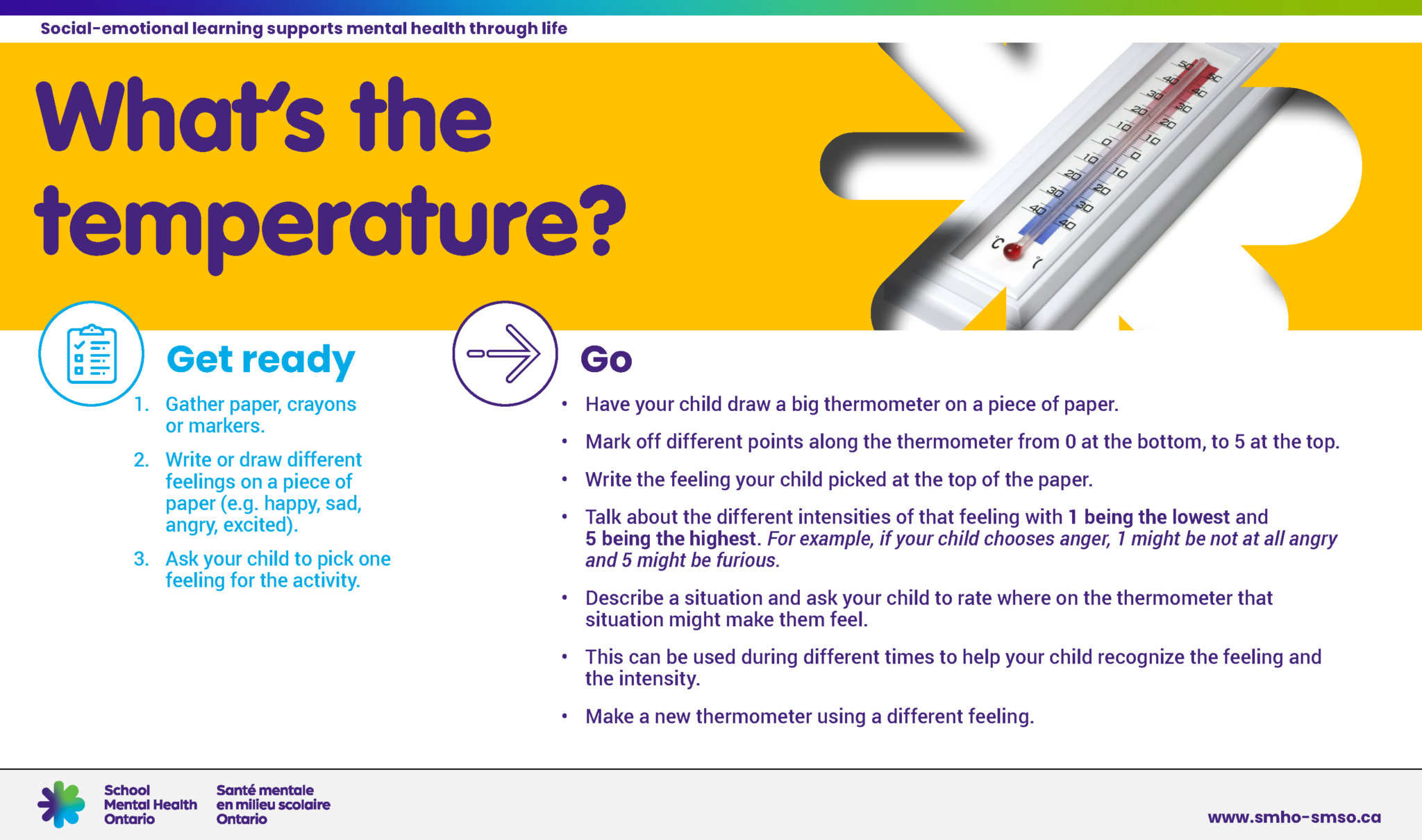
The following are articles, resources, and activities on mental health. We encourage Durham Catholic families, students, and staff to utilize these strategies as needed.
Self-regulation is the ability to recognize and manage stress levels. It is the ability to achieve the preferred state of alertness for the given situation. Self-regulation comes more easily to some children than others. There are many reasons for this, including temperament – all children are born with temperamental traits that can affect self-regulation. It’s also important to understand that self-regulation has nothing to do with being strong or weak, and that children and teens who find self-regulation difficult are not intentionally misbehaving. The problem has to do with an over-stretched nervous system. These children need more assistance from adults to stay calm and focused. When children and teens are calmly focused and alert, they are best able to: regulate their emotions; pay attention; ignore distractions; inhibit their impulses; assess the consequences of an action; understand what others are thinking and feeling, as well as the effects of their own behaviour on others (Shanker, 2013).
As parents and educators, we can teach children and teens to understand and manage their physical state and their feelings in various situations. Our goal should be to create environments where students become self-aware of their stressors and equipped with the skills and strategies necessary to maintain a positive state of calm, alert focus.
Keep in mind that difficulty in self-regulation that occurs across a number of settings and over long periods of time may be a warning sign that mental health difficulties may be present that may require further assessment by a qualified professional.
A great way to care for your child’s mental health is to focus on social-emotional learning. Social-emotional learning is how we develop skills to support our mental health and success through life. Among other things, social-emotional learning skills help us to develop self-awareness and sense of identity.
Children need to know they matter. You can help your child feel capable and become comfortable sharing their ideas and feelings. Inspirational Graffiti is a fun and easy mental health activity that parents can use to help their elementary-age children express themselves. You can find this activity, and others, at this link: https://smho-smso.ca/blog/12-easy-and-fun-mental-health-practices-to-try-with-your-children-at-home/
It’s important that we all know how to help someone who’s struggling with their mental health, especially during COVID-19. The trusted experts at jack.org have shared 5 Golden Rules for helping a friend:
1. Say what you see – speak to the facts without making assumptions
2. Show you care – just knowing that someone is there can make a huge difference
3. Hear them out – give them space to speak, and validate their feelings
4. Know your role – set boundaries in order to protect your relationship with the person, and your own mental
health.
5. Connect them to help – offer to help them find help; accompany them to approach a caring adult in the school
community or to access a help line.
DCDSB students can call the Social Work Access Line: 905-576-6150, ext.21021 or use the Access Line button on the board website. (Please note that this is not a crisis line, but a Social Worker will respond and offer support).
Kids Help Phone is also available 24/7 by phone or text for kids, teens and young adults: 1-800-668-6868 or text “connect” to 686868.
Additionally, students can reach a crisis counsellor at 301 COPE: 1-855-310-COPE (2673).
As summer approaches, children, teens and adults are encouraged to turn off the TV, put down the electronics and get outdoors. A growing body of research has shown that contact with nature offers many health benefits. It can offer relief from stress and improve physical and emotional health, allowing us to clear our mind and gain perspective.
For children, being in nature allows for creative play and provides an opportunity for imagination to take over. When exploring nature, children are involved in a shared experience, which can foster social interaction and deepen friendships. Research has also shown that nature can improve a child’s capacity to pay attention.
Some outdoor activities for all ages include going on a nature outing or hike with the family; planting and caring for a garden together; visiting a local park to throw a ball, have a picnic or read a book under a tree.
With regard to healthy child development, contact with nature may be as necessary as adequate sleep and good nutrition. For these many reasons, engaging children and youth in nature activities is important.
Staying Positive: Gratitude Moment
A great way to care for your child’s mental health is to focus on social-emotional learning. Social-emotional learning is how we develop skills to support our mental health and success through life. Among other things, social-emotional learning skills help us to stay positive.
You can help your child learn how to stay positive in different situations and to feel hopeful about the future. Optimism helps all of us! These activities focus on seeing the good in situations. Gratitude Moment is a fun and easy mental health activity that parents can use to help their elementary-age child focus on the positive and things they’re grateful for.
You can find this activity, and others, at this link: https://smho-smso.ca/blog/12-easy-and-fun-mental-health-practices-to-try-with-your-children-at-home/
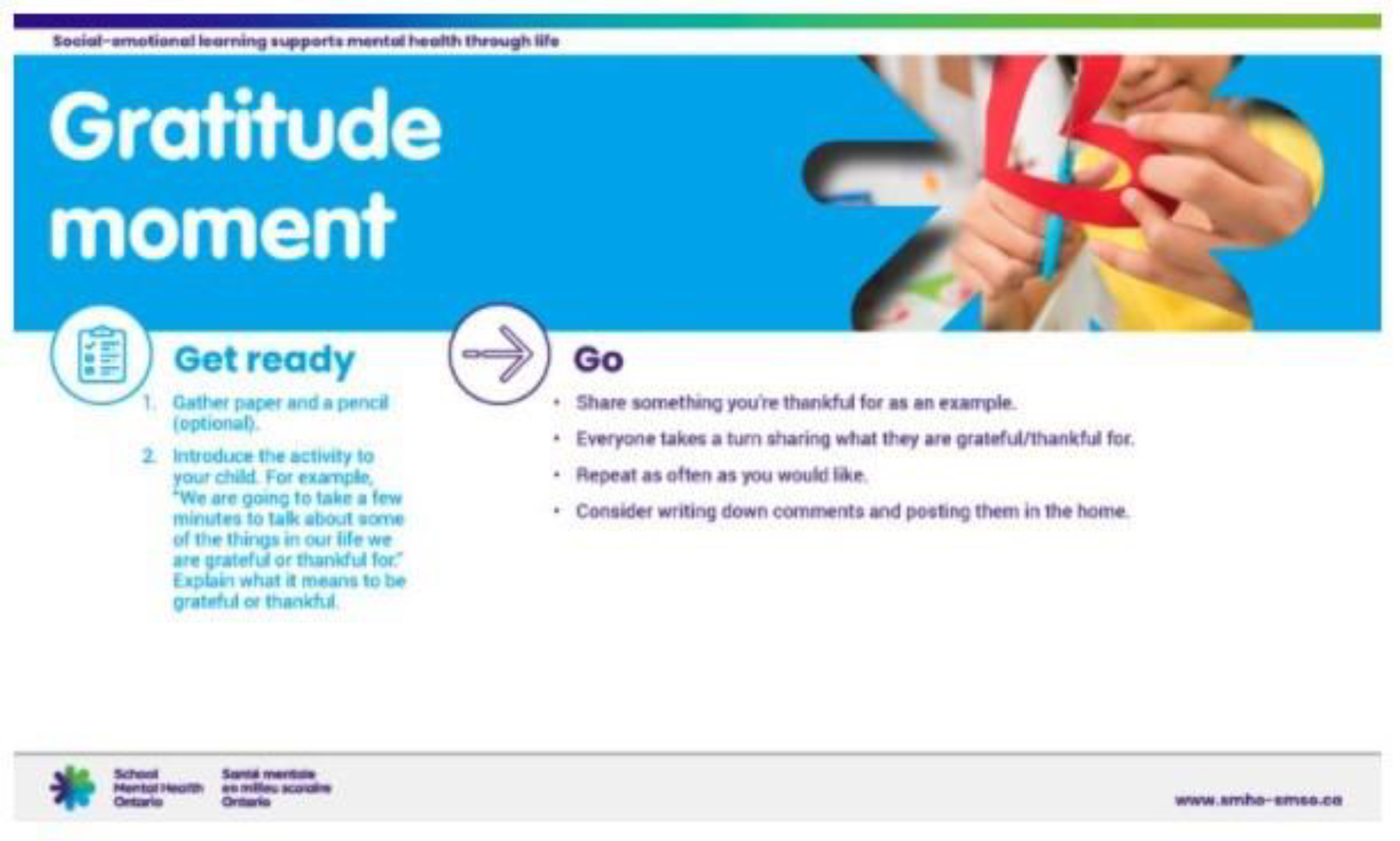
How Gratitude Relates to Well-Being
Gratitude is the virtue that makes us aware and appreciate the gifts we receive each day. To express thankfulness is a simple way to share our faith as it fills our hearts with a readiness to cherish all that we have. Even in challenging times, if we look around, we can find something or someone to appreciate. This doesn’t cancel out what’s hard in our lives, but it does invite a sense of balance and reminds us of what we have. Gratitude can arise spontaneously, but it can also be cultivated.
Viewing the world and relationships through a lens of gratitude can help us notice and appreciate the positives in life, even when facing a challenge. Noticing and sharing gratitude can support healthy relationships and the development of resilience. The benefits of expressing gratitude also include increased happiness, higher levels of optimism, closer relationships, decreased negative feelings and reduced depression.
One activity that can help us focus on the things we’re grateful for is a Gratitude Journal. Each day, write down three things that you’re grateful for. The entries don’t have to be major events - they might be as simple as spending time with a friend or getting through a challenge. Be specific about what you write down; for example, instead of writing “I’m thankful for my family” you might write, “I’m thankful that my mom made my favourite food for dinner.”
Ideally, try to continue this practice of journaling for at least twenty-one days, as research has shown that it takes twenty-one days to develop a habit. Thinking about the good things redirects our attention toward positive thoughts, as we scan our environment looking for things we are grateful for. Over time, this can actually shift our thinking to be more positive overall.
There is a large body of evidence indicating that spiritual practices are associated with better health and well-being for a variety of reasons. Spiritual practices provide emotional comfort and reduce stress creating a positive frame of mind; they induce feelings of calm, as well as hope, gratitude and compassion – all of which have a positive effect on overall wellbeing.
God is a source of comfort, strength and love for us. In prayer, we create an opportunity to talk and listen to God. Through prayer, we enter into a deeper relationship with God that allows us to become aware of the gifts and graces given to us. Prayer enables us to share our gratitude for God’s creation, compassionate mercy, presence, and love.
Prayer also offers emotional comfort and reduces stress by:
-
Offering a sense of hope
-
Creating a positive frame of mind
-
Contributing to a “stress-buffering effect”
-
Increasing feelings of unity and trust
-
Increasing self-knowledge and self-acceptance
-
Increasing the desire to build community with others
“Prayer is an aspiration of the heart, it is a simple glance directed to heaven, it is a cry of gratitude and love in the midst of trail as well as joy; finally, it is something great, supernatural, which expands my soul and unites me to Jesus.” --St. Therese of Lisieux
For some prayer resources you can visit:
A great way to care for your child’s mental health is to focus on social-emotional learning. Social-emotional learning is how we develop skills to support our mental health and success through life. Among other things, social-emotional learning skills help us to build healthy relationships.
Downtime, play and spending time together with loved ones are some of the best things for children. You can also help your child work on relationship skills, like showing kindness and being positive. Kindness Jar is a fun and easy mental health activity that parents can use to build help their elementary-age children nurture relationships. You can find this activity, and others, at this link: https://smho-smso.ca/blog/12-easy-and-fun-mental-health-practices-to-try-with-your-children-at-home/
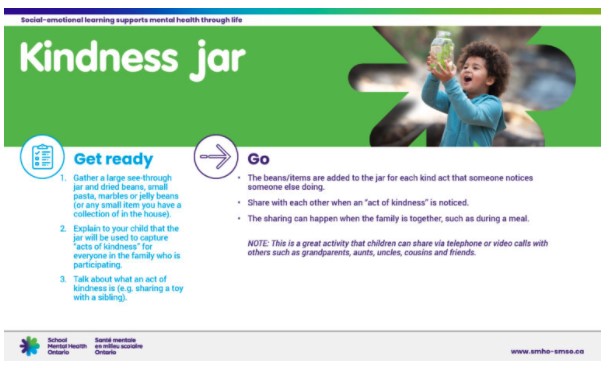
Self-care is an important part of wellness and even more important when we go through difficult and stressful times in our lives. Take time to look after yourself so that when difficult situations happen, you will have the necessary energy, resources and strategies to help you get through it! You can download the Self-Care 101 handout from School Mental Health Ontario at this link:
https://smho-smso.ca/blog/online-resources/self-care-101-for-students/
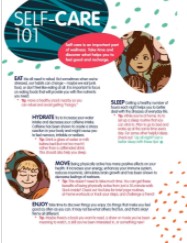
The COVID-19 Pandemic Hit Some of
Us Harder Than Others (The Realities of Different Communities)
Some of us already struggled with feelings of isolation and hopelessness before these unprecedented times. This is particularly true for those individuals who may be impacted by systems of oppression and discrimination. While some of your usual strategies for coping may not be as accessible to you at this time there are some things you can try. Remember that your identities, your communities and your friends are a source of strength. Don’t forget that there is hope. During times like these, it’s important to remember that there are some things we can control or even change, and some things we can’t. Focusing on the things we can control is a helpful mental health strategy. For more information about ways to support yourself during these unprecedented times check out the Allyship and the Equity Social Media Packs, and other online resources, on the Jack.org Youth Mental Health Resource Hub
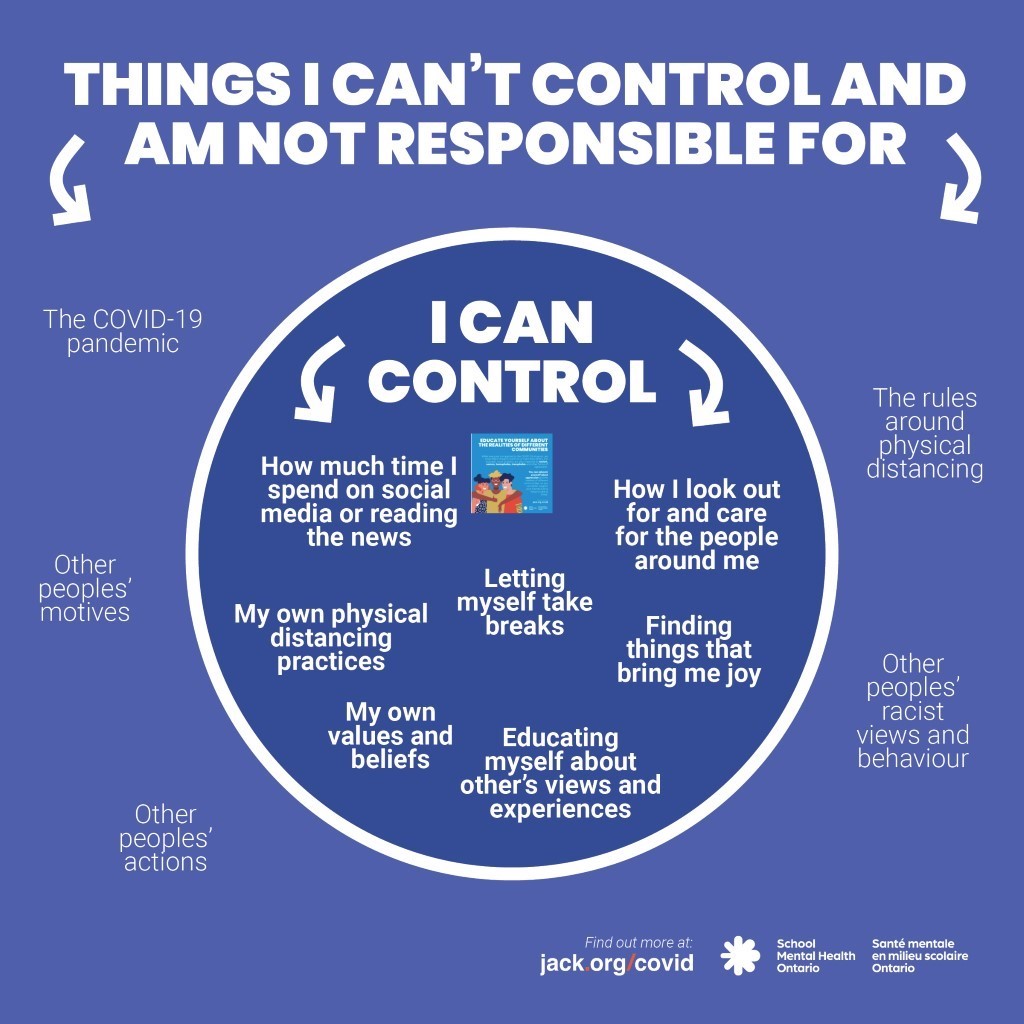
A great way to care for your child’s mental health is to focus on social-emotional learning. Social-emotional learning is how we develop skills to support our mental health and success through life. Among other things, social-emotional learning skills help us to identify our emotions.
Children don’t always know why they feel the way they do. Their emotions may appear in their behaviour and not in their words. You can help your child learn to identify, understand and express feelings. What’s the Temperature is a fun and easy mental health activity that parents of elementary school-age children can use at different times to help their child recognize their feelings and the intensity. You can find this activity, and others, at this link:
During COVID-19, and at any other time, it’s important that we look after our mental health. It’s not unusual to struggle from time to time, and it’s important to be able to notice when you might need some extra help. Talking about things is one of the ways we can take care of our mental health. Youth are encouraged to reach out to Kids Help Phone by calling 1-800-668-6868 or by texting “connect” to 686868.
This resource, from School Mental Health Ontario, supports student help-seeking by showcasing different ways to start the conversation with a trusted person and what to expect after reaching out. You can download the handout at this link: https://smho-smso.ca/blog/online-resources/reaching-out/
Individuals and families have experienced the COVID-19 pandemic in unique and varied ways. For some, significant changes to daily routines, a sense of isolation and loss, and various other factors may have led to new or increased mental health concerns.
Anyone can experience a mental health problem, including thoughts of suicide. This guide, Prepare; Prevent; Respond: A Suicide Prevention Guide for Parents and Families During COVID-19 and Return to School, is designed to help by answering some frequently asked questions so that you can prepare, prevent, and respond if your child or teen is experiencing thoughts of suicide: https://smho-smso.ca/blog/online-resources/suicide-prevention-guide-for-parents-and-families-during-covid-19-and-return-to-school/
If you’re concerned about your child, contact your family doctor or ask your principal about school mental health services that may be available. Students and families can also call the DCDSB Social Work Access Line (905-576-6150, ext. 21021) and leave a voicemail to receive a call back. (Note: this is not a crisis line and is not monitored 24/7).
If immediate safety is a concern, visit the ER, call 911 or get support from a local crisis centre. A list of local crisis resources can be found here: https://www.dcdsb.ca/en/programs-services/Mental-Health.aspx?_mid_=100106
Managing Stress: Deep Belly Breathing
A great way to care for your child’s mental health during COVID-19, or at any other time, is to focus on social-emotional learning. Social-emotional learning is how we develop skills to support our mental health and success through life. Among other things, social-emotional learning skills help us to manage stress.
Every child is different in terms of how they cope with stress. For some children, a stomach ache, temper tantrum, or extreme irritability may be signs that they are dealing with more stress than they know how to handle. Deep Belly Breathing is a fun and easy mental health activity that parents can use at home to teach their elementary school-age children a healthy way of coping with stress. You can find this activity, and others, at this link: https://smho-smso.ca/blog/12-easy-and-fun-mental-health-practices-to-try-with-your-children-at-home/
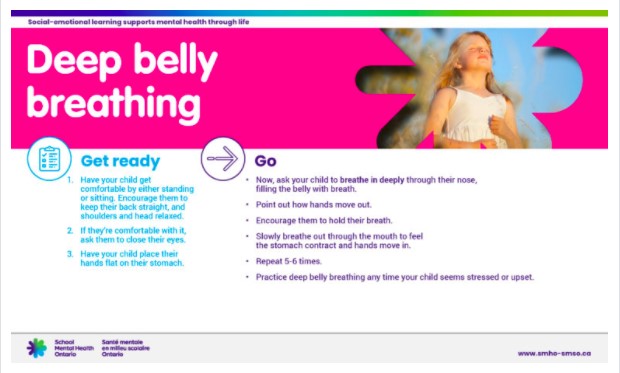
Jack.org COVID-19 Youth Mental Health Resource Hub
COVID-19 has impacted the mental health of people everywhere. Kids Help Phone has seen an unprecedented surge of young people feeling more stressed than usual reaching out during this global pandemic. Finding accurate information and appropriate resources can be hard. Jack.org, School Mental Health Ontario, and Kids Help Phone have partnered to bring you all the information needed in one easy-to-access hub so that youth mental health remains top of mind, and our communities are able to easily access the education, tools, support and reliable information they need. Please share widely with the young people in your life.
https://jack.org/Resources/COVID-19-Youth-Mental-Health-Resource-Hub
As a parent, you might notice changes in your child’s or teen’s behaviour or emotions and wonder if these changes are just normal ups and downs, if they’re associated with the pandemic or related to an emerging mental health concern. Identifying problems early, and providing caring support goes a long way towards prevention and/or worsening of difficulties. When parents discuss their concerns with their children, it opens up the lines of communication and may be the first step in helping to improve the situation. School Mental Health Ontario provides more information about how to approach the conversation, and what to do next, at this link:
https://smho-smso.ca/wp-content/uploads/2020/08/Info-sheet-noticing-concerns.pdf
If you’re concerned, you can ask your principal about school mental health services that may be available. Students and families can also call the new DCDSB Social Work Access Line (905-576-6150, ext. 21021) and leave a voicemail to receive a call back. (Note: this is not a crisis line and is not monitored 24/7). A list of local resources, including crisis lines and non-crisis support can be found here: https://www.dcdsb.ca/en/programs-services/Mental-Health.aspx?_mid_=100106
As a parent, you might notice changes in your child’s or teen’s behaviour or emotions and wonder if these changes are just normal ups and downs, if they’re associated with the pandemic or related to an emerging mental health concern. Identifying problems early, and providing caring support goes a long way towards prevention and/or worsening of difficulties. When parents discuss their concerns with their children, it opens up the lines of communication and may be the first step in helping to improve the situation. School Mental Health Ontario provides more information about how to approach the conversation, and what to do next, at this link:
https://smho-smso.ca/wp-content/uploads/2020/08/Info-sheet-noticing-concerns.pdf
If you’re concerned, you can ask your principal about school mental health services that may be available. Students and families can also call the new DCDSB Social Work Access Line (905-576-6150, ext. 21021) and leave a voicemail to receive a call back. (Note: this is not a crisis line and is not monitored 24/7). A list of local resources, including crisis lines and non-crisis support can be found here: https://www.dcdsb.ca/en/programs-services/Mental-Health.aspx?_mid_=100106

